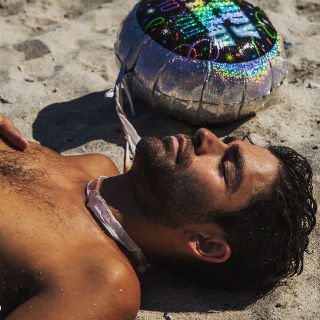Adrian Grenier has had it with drinking straws. Not because the little paper wrapper is hard to open, or because if they bend and split they become useless, but because they are a perfect example of an unnecessary single-use plastic. “We all encounter plastic straws daily,” Adrian Grenier tells us. “And we use plastic straws senselessly to the tune of 500 million plastic straws a day.”
You read that right. Five hundred million straws a day. Roughly 10 percent of that 500 million will eventually find its way into the ocean, and if this trend keeps up, Grenier estimates that by 2035 there might be more plastic in the ocean than fish. And that’s to say nothing of the damage it’s already doing to marine life the world over.
 One of the aims of Grenier’s latest project, the Lonely Whale Foundation (which he started in 2015 with producer Lucy Sumner) is to spread awareness about this issue and start a movement away from such a heavy reliance on single-use plastics. But why start with straws? Because, as Grenier says, “single-use plastic straws are the low-hanging fruit, the gateway to a lifestyle that eliminates single-use plastics.”
One of the aims of Grenier’s latest project, the Lonely Whale Foundation (which he started in 2015 with producer Lucy Sumner) is to spread awareness about this issue and start a movement away from such a heavy reliance on single-use plastics. But why start with straws? Because, as Grenier says, “single-use plastic straws are the low-hanging fruit, the gateway to a lifestyle that eliminates single-use plastics.”
Straws are something most people use, and, as such, they represent an easy first step in the holistic lifestyle change that needs to happen before we see single-use plastics completely phased out. The Lonely Whale Foundation is currently launching their #StrawlessOcean campaign, which encourages people to ditch the plastic straws that they use at restaurants or in their own homes.
“You find yourself having to educate the wait staff or the restaurants you frequent, because we as a society are just still asleep at the wheel when it comes to single-use plastics,” Adrian Grenier says.
Of course, that’s easier said than done. Plastic didn’t become so ubiquitous by being expensive, and, unfortunately, profit motive often provides resistance to sustainable movements like this one. Even when individuals make a concerted effort towards social change, that social change often needs the support of whole industries to really start taking off.
“That’s why, I think, industry and businesses need to take a leadership role in changing their habits,” Grenier says. Instead of chasing their bottom line, they need to find ways to create closed-loop systems or reduce the amount of waste that they produce. “Those few outliers, those few businesses who are brave enough to take that leap and endure the expense of change,” he continues, “are really going to be the most beneficial to us.”
 Part of the Lonely Whale Foundation’s mission is to help ease that “expense of change” by reducing the burden that companies face. Dell, for example, made Adrian Grenier its first “Social Good Advocate,” a role which saw him help the company develop a new program in which plastics bound for the ocean will be retrieved and reintegrated into Dell’s supply chain. Confident that this new program will be successful, Grenier hopes that Dell’s foray into more sustainable practices will encourage other companies to do the same.
Part of the Lonely Whale Foundation’s mission is to help ease that “expense of change” by reducing the burden that companies face. Dell, for example, made Adrian Grenier its first “Social Good Advocate,” a role which saw him help the company develop a new program in which plastics bound for the ocean will be retrieved and reintegrated into Dell’s supply chain. Confident that this new program will be successful, Grenier hopes that Dell’s foray into more sustainable practices will encourage other companies to do the same.
One of the things stopping us from living sustainably, Grenier claims, is our lack of an immediate relationship with the environment – particularly the ocean. “I believe that we are quite disconnected with the ocean,” he says. “It’s out of sight, out of mind…it doesn’t relate to our everyday experience living in cities and on land.” But, he says, at the same time, it’s full of wonder, majesty, and mystery. Grenier cites his experience swimming in the Strait of Messina as a way to spread awareness for the Lonely Whale Foundation: “Facing the great expanse of the ocean, the abyss below is a very profound, existential experience to humble yourself to nature…and to realize that in order to survive, you really have to respect the laws of nature. I think that’s a lesson that we as humanity have forgotten and need to relearn.”
And Grenier, of course, is right that water is one of our most important resources, making cleaning up the plastic in the ocean – and preventing it from getting there in the first place – all the more important. “It’s where we all came from,” he says. “And it could be, if taken care of, the source for more life.”
So, where do you begin? Grenier’s advice is to find a partner, someone who will share this work with you. “You don’t have to hold the weight of the world on your shoulders all by yourself,” he tells us. “You’ll inspire each other; you’ll hold each other accountable, but it’s also more fun when you do it with your friends.”
From there, he says, start simple and start small. Even though they might seem trivial, try eliminating plastic straws from your life. Then try to see how much you can inspire your friends, neighbors, and maybe even the local businesses that you frequent. “If you can do that, you can make a huge difference,” Grenier claims. “And I guarantee it’ll be the gateway to other changes.”
By Andrew Janson and Charles Warner
Photos Courtesy of The Lonely Whale Instagram










